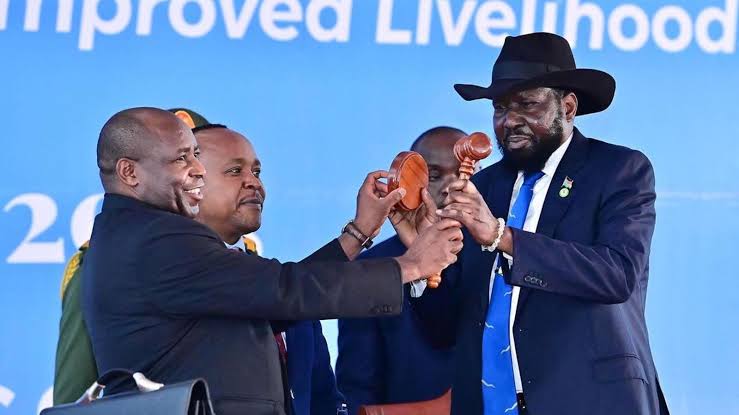
Faith Nyasuguta
During a two-day visit to Lagos, Nigerian and French companies signed several agreements in principle on Thursday, focusing on agriculture, energy, and technological innovation.
This development underscores France’s commitment to strengthen investments in Nigeria, especially at a time when its military presence faces challenges on the continent.
Olivier Becht, the Minister Delegate in charge of French foreign trade, led the economic summit between France and Nigeria.
Emphasizing the significance of Nigeria as a key partner, Becht highlighted that France has approximately a hundred companies operating in Nigeria, employing over 10,000 people. He announced Nigeria’s inaugural participation in the Paris International Agricultural Show in February.
The signed agreements involved prominent companies such as Compagnie Fruitière/Raedial Holdings, Danone/Koolbok s, Echosys/Rensource and Watt Renewables, and Bpifrance/Access Bank, covering agriculture, energy, and technological innovation sectors.
Didier Mas, Technical Director for Africa at Compagnie Fruitière, expressed optimism about Nigeria’s potential, particularly with the government’s commitment to openness. Compagnie Fruitière aims to partner with Readial Holdings for banana cultivation in Cross River State.
Bpifrance signed a “letter of intent” with Access Bank, intending to expand their activities in France and Nigeria. Michael Wenegieme, Head of the France department at Access Bank, cited Bpifrance’s significant influence in the financial sector as a key factor.
Olivier Becht’s visit, accompanied by French companies, follows the visit of Catherine Colonna, French Minister of Foreign Affairs, to Abuja on November 3.
Contrary to some media narratives, Becht emphasized that France is not retreating from Africa but aims to consolidate its presence through economic engagement, countering the influence of China and Russia on the continent.
This strategic approach aligns with France’s intent to leverage its economic weight amid military withdrawals from Niger, Mali, and Burkina Faso.
In recent years, relations between West Africa and France have undergone notable shifts, marked by a combination of economic engagements, geopolitical considerations, and regional dynamics.

Historically, France has maintained strong ties with its former colonies in West Africa, often playing a significant role in political and economic affairs. However, evolving geopolitical realities and the emergence of new players have influenced the landscape.
Economically, France continues to be a major investor in West Africa, with numerous French companies operating in the region. The economic ties have been reinforced through initiatives such as economic summits and trade agreements.
President Emmanuel Macron’s administration has emphasized the importance of a renewed partnership based on mutual interests, with a focus on sustainable development and economic growth.
Nevertheless, France faces increasing competition in the region, notably from emerging powers such as China. China’s growing economic presence in West Africa, characterized by infrastructure investments and trade partnerships, has posed a challenge to France’s traditional influence.
The Belt and Road Initiative, in particular, has opened avenues for Chinese engagement in key sectors across West African countries.
In addition to China, Russia has also sought to strengthen its ties with West African nations. While Russia’s influence in the region may not match that of other global players, Moscow has engaged in diplomatic and economic overtures, particularly in the areas of defense and resource extraction.
The dynamics of regional security have further shaped relations. France’s military involvement in counterterrorism operations in the Sahel region has been met with both support and criticism.
As France navigates its military presence in the face of evolving security challenges, regional partners seek a balance between addressing security concerns and maintaining sovereignty.
Ultimately, the past few years have witnessed a nuanced evolution in the relations between West Africa and France. Economic partnerships, geopolitical considerations, and the emergence of new global players have contributed to a complex landscape.
France continues to be a significant player in the region, but it faces competition and must adapt to the changing dynamics of West Africa’s international relations.
RELATED:




